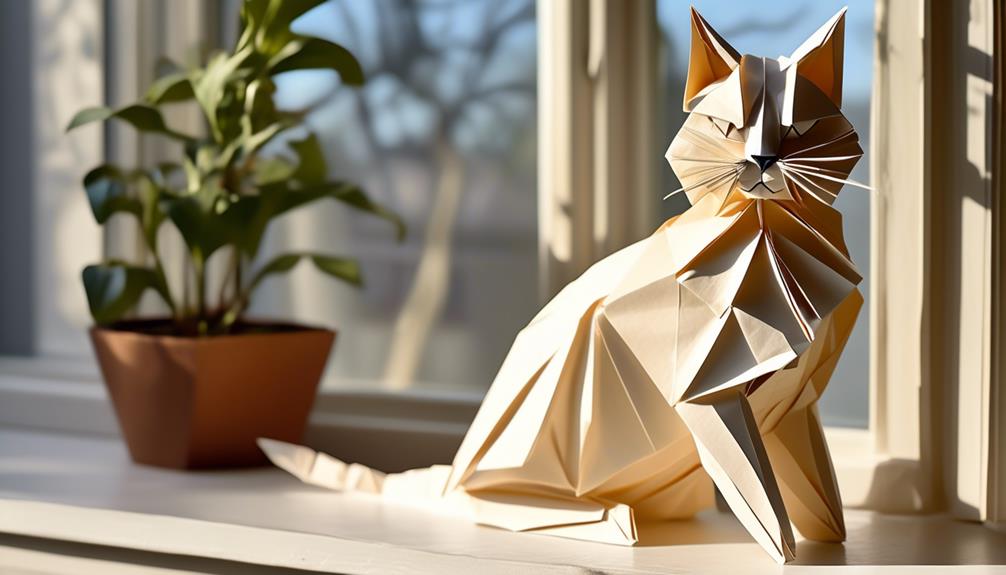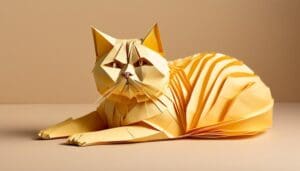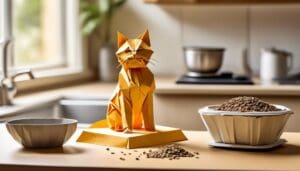You’ve likely heard the theory that weight loss in older cats must be handled with care, and you’re right to take this seriously. As your cat ages, maintaining a healthy weight becomes crucial for their overall well-being. It’s essential to approach this gently; after all, they’re not just pets, but cherished members of your family.
You’ll need to consult with your vet to tailor a plan that suits your cat’s specific needs, ensuring the weight loss is safe and effective. Let’s consider how you can start this journey together, step by step, with understanding and patience.
Key Takeaways
- Schedule a consultation with your vet to create a personalized weight loss plan for your older cat.
- Assess your cat’s current diet and consider switching to high-quality diet food formulated for weight management in older cats.
- Incorporate regular exercise, such as playtime with toys and climbing structures, to support healthy weight loss.
- Monitor your cat’s weight regularly and make adjustments to the diet and exercise plan as needed for safe and gradual weight loss.
Consult Your Veterinarian
Before your older cat starts a weight loss plan, it’s important to visit the vet to make sure the plan suits your cat’s individual health requirements. Realizing your cat needs to lose weight shows you care, but remember, older cats may have health issues that make losing weight more difficult, so it’s important to approach this with consideration.
When you make an appointment, your vet will examine your cat to check for any serious health issues that could be contributing to their weight. They’re not just the medical director of your cat’s health; they’re a partner in your commitment to nurturing a healthier life for your beloved cat.
During your visit, don’t hesitate to discuss your cat’s habits, diet, and lifestyle. Your vet can offer invaluable medical advice and create a safe, personalized weight loss plan. This plan may involve small changes to your cat’s diet, which can significantly impact their overall well-being.
Assess Diet Adjustments
After consulting with your vet, take a closer look at your older cat’s current diet to pinpoint where you can make nutritious adjustments that will aid in their weight loss. It’s about serving your cat by providing them with the best nutrition possible.
Adjusting what you feed your cat is crucial. High-quality diet food, specifically formulated for weight management in older cats, can be a game changer. These foods often contain fewer calories and are low in carbohydrates while being high in protein, which helps maintain muscle mass during weight loss.
Here’s a straightforward guide to help you assess:
| Aspect | Current Diet | Adjustments Needed |
|---|---|---|
| Number of Calories | High | Reduce to vet’s recommendation |
| Carbohydrate Content | High | Switch to low carbohydrate |
| Protein Level | Low | Increase to high protein |
| Amount of Food | Unmonitored | Measure precise portions |
| Type of Food | Generic | Introduce new food tailored for older cats |
Introduce Regular Exercise
While adjusting your older cat’s diet is fundamental for weight loss, complementing dietary changes with regular exercise is equally important in helping them shed those extra pounds. Encouraging your older cat to engage in daily play and physical activity not only supports healthy weight loss but also enhances their overall well-being.
Start by incorporating toys and laser pointers into your cat’s routine to stimulate movement and play. These simple tools can spark your cat’s natural hunting instincts and increase their activity level.
As your cat’s body weight becomes a concern if they’re an obese cat, it’s vital to help your cat lose weight through calories burned during exercise. Climbing structures and vertical spaces in your home can also offer your cat exciting opportunities to move and explore.
Monitor Weight Progress
To ensure your older cat’s health and well-being during their weight loss journey, it’s crucial to regularly monitor their progress, adjusting their diet and exercise plan as needed. You’ll want to create a loving and supportive environment for your cat as they work towards their ideal body weight.
Remember, weight loss in Senior Cats should be gradual. A rapid drop in weight can be harmful. Aim for them to lose weight at a rate that keeps them vibrant and healthy.
Track their weight every four weeks to ensure they’re not losing weight too quickly. A slow and steady reduction is key. It’s estimated that a significant percent of cats are overweight or obese, so carefully monitoring caloric intake is essential.
Celebrate small victories and be patient. Your cat’s weight loss journey is a testament to your dedication to their well-being. Adjust the plan as necessary, and remember, you’re doing a wonderful job caring for your senior cat.
Address Behavioral Changes
As you meticulously track your older cat’s weight, also pay close attention to any shifts in their behavior or eating patterns, as these can be early signs of health issues that may affect their weight management.
Pet parents like you play a crucial role in fostering healthy weight loss for your cat.
Here’s how you can address behavioral changes:
- Monitor Eating Habits: Changes in appetite or interest in food can signal discomfort or illness. Ensure the feeding plan accommodates their body condition and health needs.
- Create a Calm Environment: Stress can impact your cat’s behavior and eating habits. Provide a peaceful space to help them feel secure and encourage proper feeding behavior.
- Encourage Activity: Engage in gentle play to promote movement, which is essential for weight loss in older cats. This interaction also allows you to observe any changes in their mobility or energy levels.
- Incorporate Mental Stimulation: Use puzzles or enrichment activities to keep your cat’s mind active, potentially aiding in managing excess weight.
Frequently Asked Questions
How Can I Help My Elderly Cat Lose Weight?
You’re doing great caring for your elderly cat. Start with vet advice, feed a balanced diet, encourage play for exercise, and track their weight loss. Adjust as needed and keep up the good work!
Why Is My Old Cat Getting skinny but Still Eating?
Your old cat’s weight loss, despite a hearty appetite, might be a health red flag. It’s best to consult with your vet to uncover any hidden issues and ensure their golden years shine.
What Can I Feed My Elderly Cat to Gain Weight?
Give your old cat foods that are high in calories and nutrients made for older cats. Also, giving them small meals often and using supplements recommended by a vet can help your cat put on weight in a safe and healthy way.
Why Do Cats Get Bony as They Age?
It is incorrect to assume that diet is the sole factor. As cats age, they naturally lose muscle and fat, which causes them to appear bony. Regular veterinary check-ups can help control this issue.




